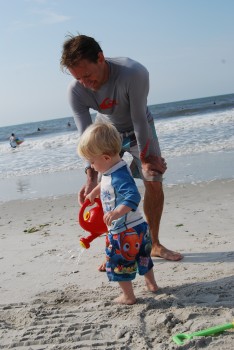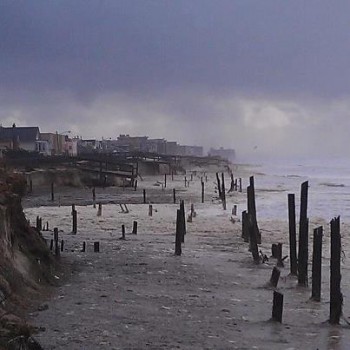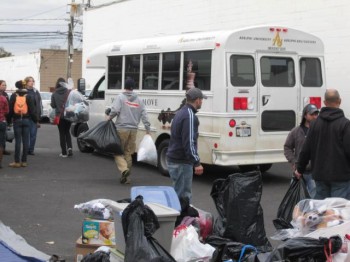 My home away from home is Long Beach, NY, where I spend every weekend for half the year surfing, playing beach volleyball, splashing in the ocean with my kids, and hanging out with my friends generally enjoying life.
My home away from home is Long Beach, NY, where I spend every weekend for half the year surfing, playing beach volleyball, splashing in the ocean with my kids, and hanging out with my friends generally enjoying life.
So my heart has been broken lately to see the total devastation that Long Beach has gone through with Hurricane Sandy. Many people that I know have lost their homes, their cars, their belongings, etc.
Although recovery is in progress, there has been no electricity, no water, no plumbing or sewer system, and the town has been evacuated. This beautiful beach paradise has become a literal disaster zone.
 I was trying to think about what lessons I could draw from positive psychology that could possibly help people who lost so much and I was reminded of the earthquake in Japan. The Japanese people were recognized for their resilience and heartiness in the face of this great tragedy.
I was trying to think about what lessons I could draw from positive psychology that could possibly help people who lost so much and I was reminded of the earthquake in Japan. The Japanese people were recognized for their resilience and heartiness in the face of this great tragedy.
One writer, Tim Patterson, noted that the Japanese resolve was reflected in their langauge. As he communicated with his ex-girlfriend in Tokyo in the days following the crisis, he observed the following phrases:
Shoga Nai: This is basically the equivalent of “shit happens.” Or accepting the things that you cannot change. In psychology, acceptance is a key part of mindfulness: observing what is going on with acceptance and equanimity.
Acceptance helps us to avoid spiraling down by lamenting things we cannot change and is a good base from which to move forward focusing on what we most value.
Ganbatte: According to Patterson, this is the cry that Japanese sports fans will use to cheer on their favorite athletes. It is a cry of encouragement telling people to “go for it” and do their best.
In the days following Hurricane Sandy, I have seen Long Beach residents supporting each other in this way. They have cheered each other on with words of hope such as “Long Beach: Down but not Out” and “We Will Rebuild.”
Gaman: Patterson says the Carp seen in Japanese flags and kites is a national symbol of “gaman” or perseverance. The Carp embodies the spirit of gaman by tirelessly swimming upstream. Patterson defines gaman as the ability “to struggle and persist in an endeavor without complaining, despite seemingly insurmountable challenges.”
Most of my friends in Long Beach are not wasting time complaining about what has happened to them. They are focused on how they can move forward and rebuild.
 Ittai: Another article on the Japanese earthquake cites the Japanese prime minister Naoko Kan talking about “ittai” or the Japanese people “becoming one body.” The community came closer together after the earthquake and the tragedy brought out a sense of unity and brotherhood.
Ittai: Another article on the Japanese earthquake cites the Japanese prime minister Naoko Kan talking about “ittai” or the Japanese people “becoming one body.” The community came closer together after the earthquake and the tragedy brought out a sense of unity and brotherhood.
The people I know in Long Beach are more worried about their neighbors than they are themselves. Long Beach citizens have been uniting to help those in the greatest need.
We all know that the natural reaction to stress is “fight or flight.” People in stressful situations are predicted to become more aggressive or “leave the scene.” But this is not what we are seeing in Long Beach. In stead, people are reaching out to others and looking for ways they can help each other out.
New research suggests, that “fight or flight” does not tell the whole story. We also “tend and befriend.” When people come through a stressful situation, they become more cooperative, social and friendly, “a connection that may be responsible, at least in part, for our survival as a species.”
My beloved friends in Long Beach are coming together in this way, and it is an inspiration to see. And while some scars from this tragedy will remain for years to come, they will also look to the future with a deeper bond to each other and to their town, and a new perspective on the important aspects of life.
Ittai Long Beach. Ganbatte!
Please send any donations for Long Beach (supplies) to 157 E Sunrise Hwy, Freeport, NY 11520, attention Chris Musto.
Or monetary donations to http://www.jaimewhelanfoundation.com/ a 501(c)(3).
I will be donating 100% of the revenues from e-book purchases this month through my website. See The Psychology of Spas and Wellbeing.
by Jeremy McCarthy

Bless your sweet, generous heart, Jeremy. You have your own private loss and now you are reaching out to help others. TERRIFIC. I am from DE and know folks there, too, who lost to this monster storm.
I will send a check to help. Hope everyone who reads this blog does, too.
Hope for rebuilding ASAP.
Your blog was amazing about Japan and I loved the juxtaposition.
Our villages are united.
Peace and sunnier days,
Judy
Such inspiring thoughts shared here Jeremy! I witnessed something similar in the forest where I live back in 2009, though it was the trees that took the brunt of it, thousands of them, while homes and cabins scattered about were (by some astonishing blessing) undamaged. We also lost power and with it water etc. .
As you describe here, the crisis brought our rather fragmented small community together in a powerful way, and restored our trust in each other. Now we are tending to the forest in a way we did not before. We spend much more time out in it, appreciating the resilience of the land and the way in which it recovers itself.
We are observing this natural healing, as much as imposing ourselves on it. So, I hope that as this lovely beach town works to restore itself in terms of human infrastructure, people will also take the opportunity to explore how they can support and care for the land, its plants and other creatures.
I wonder if there is a Japanese word for renewed appreciation after shock?
PS I think you would enjoy the work of my friend Trebbe Johnson through Racial Joy for Hard Times too: http://radicaljoyforhardtimes.org/
Thank you for these words and your generousity.
Your words will be deeply appreciated by the residents/survivors of Long Beach who, as you mentioned, are already on the move to rebuild.
As a resident of the Caribbean, natural disasters such as this are no stranger, in fact these are yearly occurances throughout the Caribbean.
Your words have reached and touched many more than you may know, in all kinds of disastrous situations.
Sympathy, empathy, active support, thoughts and prayers know no boundaries.
Thank you for the positive and powerful energy that you are spreading.
Wellness all around
Kathy
.
I thought te research suggested tend and befriend was a female response
Oz, Yes that is correct, but follow the link above, there is a new study showing the tendency of men to collaborate in stressful situations. Thanks, J
Sara, Judy, Kathy, thank you for your kind comments. Sara, what an amazing site you shared. I love it.
Jeremy – I checked out th study – the usual suspects in psychology studies to relevance is really questionable
We have no idea what the motivation is – could it just be a socially conditioned – the right thing to do
By the way is it the stress response or the recovery – parasympathetic nervous system – interestingly now being dubbed pause and reflect
Isn’t that what many people are doing?
Hi Oz, I definitely don’t think it’s socially conditioned. I happened to be in NY on September 11 (http://psychologyofwellbeing.com/201109/my-memory-of-september-11.html.) In the days after September 11, you would not believe the closeness and kindness in every interaction in the city. For days, weeks and even months after, people felt a much deeper connection to each other (and to their city and their country.) I believe it’s because everybody was more aware of their own mortality, the impermanence of life, and how small we are as individuals. But that’s just my personal experience.
“Is it the stress response or the recovery?” It’s a great question and something I hadn’t thought of before.
Jeremy – perhaps its your perceptual filter?
Jeremy – this might surprise you but the rest of the world may not see the deep connection with your country after s11 as such a good thing.
That most definitely does not surprise me and I would even agree. It is not my intention to argue that unity is always good and always used for good purposes.